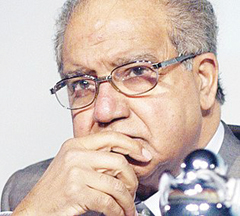 Abdullah Al-Naibari
Abdullah Al-NaibariKUWAIT: Former MP Abdullah Al-Naibari said that the government's economic and financial reform plan is an attempt to reform the state budget's income by either avoiding a current deficit or avoiding an expected one. He added that the reform was an attempt to find supportive economic resources to assist oil that would someday be used up.
"The reform plan depends on facilitating national and foreign investments," he added, noting that the government's plan mainly relies on 'selling' public sector companies and privatizing healthcare, education, public works, the oil sector and the airport. "This will not lead to finding new resources and will not solve the problem," he underlined.
Naibari stressed that national labor would be facing unknown destinies in case of privatizing the state's establishments and public services because the private sector would not hire nationals nor would citizens themselves want to work for the private sector. "Unlike our ancestors, citizens now are very dependent on the government - they do not work and want to get everything without working hard," he said, warning that a deficit was inevitable within the coming seven years because spending would grow to reach $52-88 billion by 2030. "The remedy will not be achieved by increasing electricity and water prices because such increases would at most make $100-200 million while electricity subsidies alone would be more than $2 billion," he pointed out.
Development plan
Minister of Social Affairs and Labor and Minister of State for Planning and Development Hind Al-Subaih said that the new development plan has adopted two main courses - one dealing with challenges and the other reinforcing changes needed to achieve Kuwait's "Vision 2030". Responding to an inquiry by MP Saud Al-Huraiji, Subaih stressed that 19 legislations needed for the 2010/2011-2013/2014 fiscal years in addition to seven legislations needed for the 2010/2015 plan had been achieved.
Subaih added that according to the supreme planning and development council's secretariat general's report, previous development plans had been fruitful. She added that special teams had been formed to follow up each development project on a monthly basis and carry out various field visits to probe any hindrances and report to decision makers to solve them. "All ministers and undersecretaries have been provided with a 'dashboard' system to follow up the progress of development projects under their jurisdiction in order to report back to His Highness the Prime Minister" Sheikh Jaber Al-Mubarak Al-Sabah, she underlined.
Farming lands
Chairman of the Public Authority for Agricultural Affairs and Fish Resources (PAAAFR) Faisal Al-Hasawi said that the authority intends to withdraw farming lands that had not been used by owners for a long time. "The lands will not only be withdrawn, but a KD 10,000 fine will be collected as well," he underlined. Hasawi said that once the municipal council approves the project, PAAAFR intends to distribute up to 10,000 sq m of land to citizens wishing to live along the border area from Salmi to Abdali. He added that PAAAFR would also distribute farms and ranches to families who do not own any and noted that if applicants are too many, the land area would be reduced to 5,000 sq m so that applicants could utilize those lands in farming, raising cattle and poultry and fish farming.
By A Saleh










